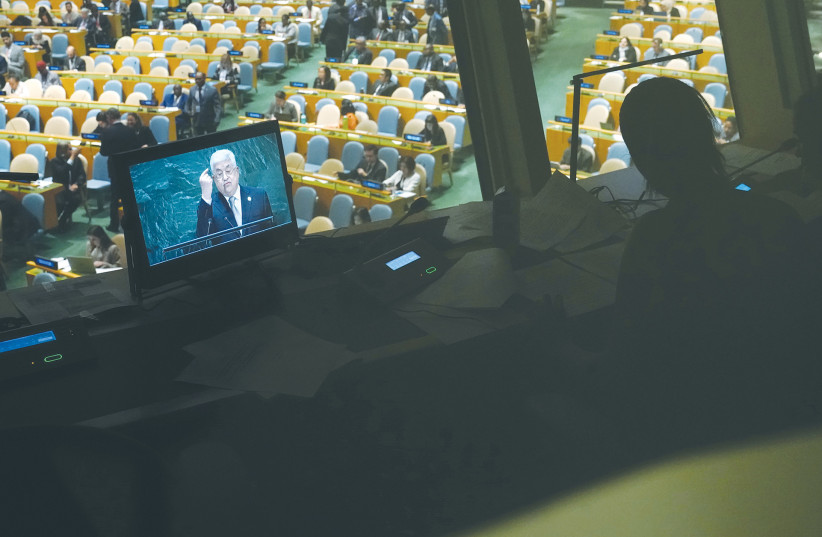Despite intensive diplomatic efforts by Israel, the UN General Assembly on Friday decided to seek an advisory opinion from the International Court of Justice at The Hague on the legal consequences of Israel’s “occupation, settlement, and annexation of Palestinian territory.”
It could take years before the ICJ reaches a decision, and its opinions are non-binding, but Israel cannot be complacent about the process. Such a ruling in The Hague could be used by the UN and other international bodies and would have a diplomatic and economic impact.
The vote was supported by 87 of the body’s 193 member states while 26 countries opposed the resolution, 53 abstained and 27 were absent.
Countries that voted with Israel against the decision included the US, Canada, Australia, and eight of the EU’s 27 member states.
The resolution seeks an ICJ advisory opinion on whether, after nearly 57 years, Israel’s “occupation” of Palestinian territory had become a form of de-facto annexation and hence illegal under international law.

The ICJ
It asked the ICJ to define how Israel’s practices affected the legal status of Israel’s “occupation” of territory over the pre-1967 lines, which would include the West Bank (Judea and Samaria), Gaza (from which Israel unilaterally withdrew in 2005) and east Jerusalem.
The UNGA resolution specifically included the “Holy City of Jerusalem” and referred to the Temple Mount, Judaism’s holiest site, only by its Muslim name of al-Haram al-Sharif.
When a preliminary vote on the request for an ICJ opinion was held in November, 98 countries voted in favor and only 17, including Israel, opposed it.
Prime Minister Benjamin Netanyahu credited the drop in support for the Palestinians’ position and the additional support for Israel to his efforts, along with those of President Isaac Herzog, the Foreign Ministry and UN Ambassador Gilad Erdan.
“This is once again a one-sided Palestinian move that undermines the basic principles for resolving the conflict and potentially harming any possibility for a future process. The Palestinians want to replace negotiations with unilateral measures. They are once again using the UN to attack Israel.”
Yair Lapid
Palestinian Authority Prime Minister Mohammad Shtayyeh praised the UN vote as “a new victory for the Palestinians.” Hamas also welcomed the UN vote.
It is a dangerous move that is far from solving the Israeli-Palestinian conflict and is likely to further inflame it, giving the Palestinians no incentive to sit down and negotiate in good faith.
Furthermore, the UN and ICJ are making a mockery of their own mandates and are being hijacked by the Palestinians. This is similar to the open-ended UN Commission of Inquiry into Israel headed by Navi Pillay.
The Palestinian push for the ICJ ruling is part of its ongoing lawfare against Israel. The court must avoid giving the impression of built-in bias against Israel when choosing the panel it appoints.
The decision comes at a difficult time for Israel. A new Netanyahu government has taken office in Jerusalem and is the most right-wing, with several significant clauses in the coalition agreement relating to Judea and Samaria as well as the Temple Mount, which makes the situation more complicated and sensitive.
Netanyahu must be particularly cautious when taking any steps that could significantly affect the ICJ investigation. This also requires ensuring ongoing US support. Israel must tread carefully both regarding the status of its own courts and with plans over the Green Line.
At the same time, Israel’s right to Jerusalem and much of the larger settlement blocs is a consensus issue in the country. Israel’s identity as the Jewish state is under attack when its rights to its holiest sites are called into question.
This would be a good time for the Left and Right to set aside their differences and unite around the literal common ground and find a pragmatic path that ensures Israel’s basic rights without completely alienating the international arena.
And Israel and all who truly value human rights must call out ongoing UN hypocrisy in obsessively singling out the Jewish state through distortions and lies.
